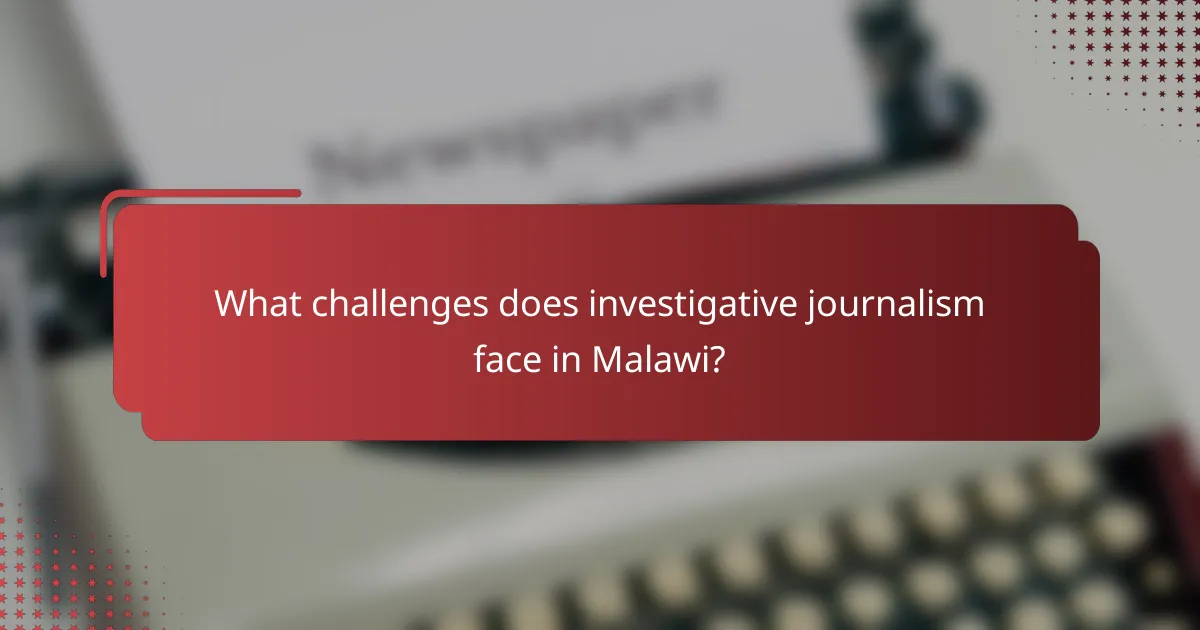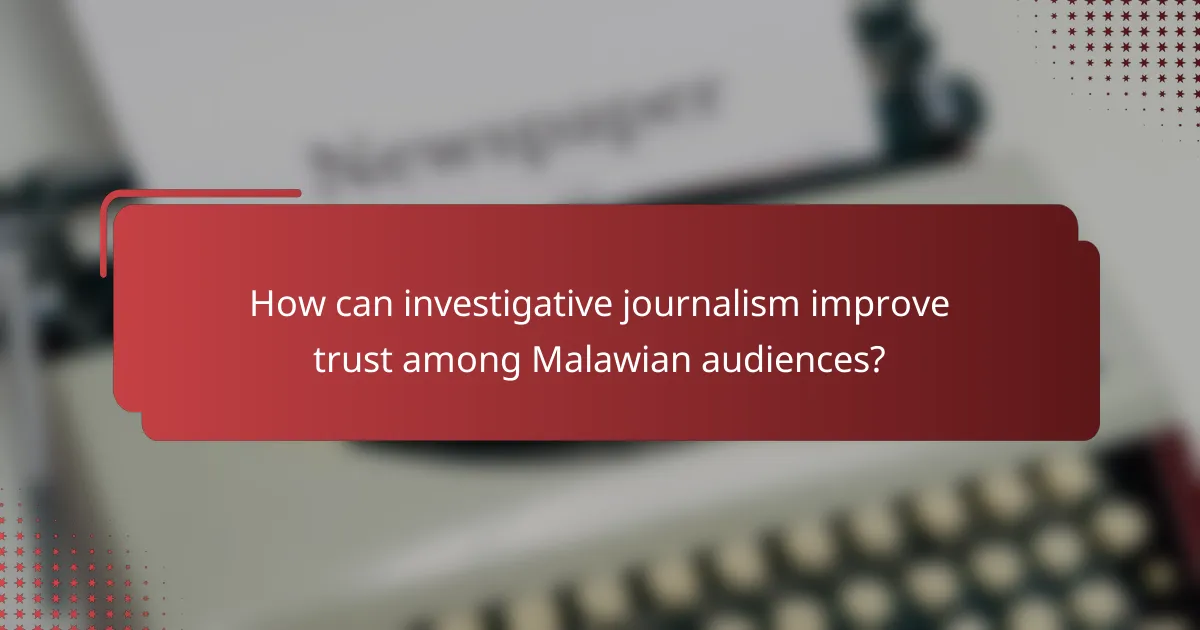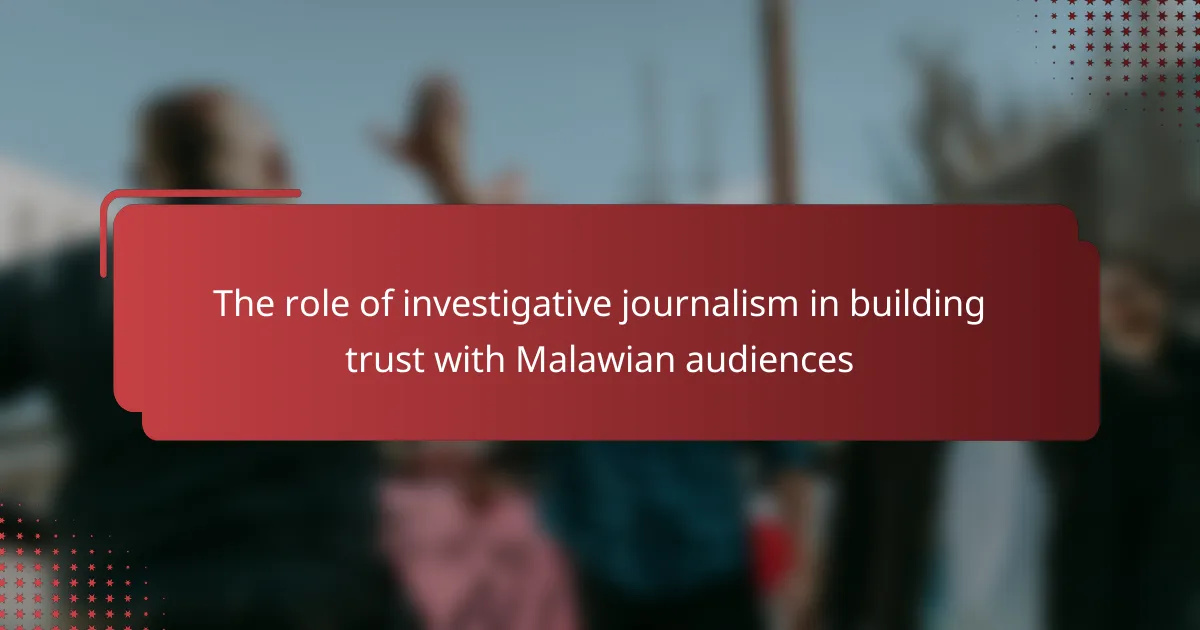Investigative journalism is a vital practice in Malawi that builds trust among audiences through transparent and factual reporting. It uncovers issues such as corruption, human rights abuses, and social injustices, holding power to account and fostering civic engagement. Despite facing challenges like limited resources, government pressure, and public distrust, effective investigative reporting can lead to significant reforms and increased accountability. By addressing local governance issues and empowering citizens with information, investigative journalism enhances the credibility of media outlets and strengthens the relationship between the press and the public.

What is the role of investigative journalism in building trust with Malawian audiences?
Investigative journalism plays a crucial role in building trust with Malawian audiences by providing transparent, factual reporting. This type of journalism uncovers corruption, human rights abuses, and social injustices that affect the public. By holding power to account, investigative journalists foster a sense of accountability among leaders. This accountability helps to create an informed citizenry that can engage in democratic processes. Furthermore, when audiences see their concerns addressed, it enhances their trust in media outlets. Trust is further solidified when investigative reports lead to tangible changes or reforms. For instance, successful investigations can prompt legal actions against corrupt officials. Ultimately, the integrity and rigor of investigative journalism ensure that Malawian audiences view media as a reliable source of information.
How does investigative journalism influence public perception in Malawi?
Investigative journalism significantly influences public perception in Malawi by uncovering corruption and holding power accountable. This form of journalism provides citizens with critical information about government actions and societal issues. It fosters transparency, which builds trust between the media and the public. Research indicates that Malawians often rely on investigative reports to form opinions about political leaders and policies. For example, the exposure of government corruption can lead to public outcry and demands for accountability. This reaction demonstrates the power of investigative journalism in shaping civic engagement and public discourse. Thus, investigative journalism plays a crucial role in informing and empowering Malawian citizens.
What are the key attributes of investigative journalism that foster trust?
Key attributes of investigative journalism that foster trust include accuracy, transparency, and accountability. Accuracy ensures that information is fact-checked and reliable. This builds confidence among audiences who rely on credible reporting. Transparency involves openly sharing sources and methodologies. When journalists disclose how information is gathered, it enhances trustworthiness. Accountability requires journalists to correct errors and address public concerns. This responsiveness shows a commitment to ethical standards. Additionally, thoroughness in research and reporting adds depth and credibility. Investigative journalism that adheres to these attributes significantly strengthens trust with audiences, particularly in contexts like Malawi, where reliable information is crucial for informed decision-making.
How does the credibility of sources impact audience trust?
Credibility of sources significantly impacts audience trust. Trust is built when information comes from reliable and authoritative sources. Audiences are more likely to accept information that is verified and backed by experts. Research shows that 85% of people trust news from credible sources. Conversely, information from questionable sources can lead to skepticism and distrust. This skepticism can damage the reputation of the media outlet. In Malawian journalism, credibility is crucial for fostering a well-informed public. Investigative journalism that prioritizes credible sources strengthens audience trust and engagement.
Why is trust important in the context of journalism in Malawi?
Trust is crucial in journalism in Malawi because it enhances the credibility of news sources. When audiences trust journalists, they are more likely to accept and act on the information presented. This is particularly important in Malawi, where misinformation can lead to significant social unrest. Trust in journalism encourages public engagement and dialogue. It allows journalists to investigate and report on sensitive issues without fear of backlash. According to a 2021 report by the Media Institute of Southern Africa, trust in media positively correlates with public awareness and civic participation. Therefore, building trust is essential for effective journalism in Malawi.
What are the consequences of distrust in media for Malawian society?
Distrust in media leads to significant consequences for Malawian society. It undermines the credibility of information sources. This results in citizens relying on unverified news, which can spread misinformation. Misinformation can exacerbate social tensions and conflicts within communities. Furthermore, distrust in media can diminish civic engagement. When people doubt media integrity, they may disengage from public discourse. This disengagement can weaken democratic processes. Additionally, a lack of trust in media can hinder accountability for public figures. Investigative journalism is crucial in restoring this trust. It provides accurate reporting that can inform and empower citizens.
How does trust in journalism affect civic engagement among Malawians?
Trust in journalism significantly enhances civic engagement among Malawians. When citizens trust media outlets, they are more likely to participate in community discussions and activities. Trust in journalism fosters informed decision-making. It encourages individuals to seek out and act on information regarding local governance and societal issues. For instance, a study by the Media Institute of Southern Africa found that higher trust in media correlates with increased voter turnout in Malawi’s elections. This indicates that when people believe in the reliability of news sources, they are more motivated to engage in civic duties.

What challenges does investigative journalism face in Malawi?
Investigative journalism in Malawi faces significant challenges. These include limited resources and funding for media organizations. Journalists often work under precarious conditions with inadequate support. There is also government pressure and censorship that stifles free reporting. Threats and intimidation against journalists are common, discouraging thorough investigations. Additionally, a lack of legal protection for journalists exacerbates these issues. Public distrust in the media further complicates the landscape. These factors collectively hinder the effectiveness of investigative journalism in the country.
How do economic factors impact the effectiveness of investigative journalism?
Economic factors significantly impact the effectiveness of investigative journalism. Funding availability directly influences the resources allocated to investigative projects. Limited financial support can lead to reduced staff and fewer in-depth investigations. Economic downturns often result in budget cuts for news organizations, affecting their ability to conduct thorough reporting. Additionally, reliance on advertising revenue can compromise journalistic integrity. Advertisers may exert pressure to avoid controversial topics. This can lead to self-censorship among journalists. In Malawi, economic constraints can limit access to information and investigative tools. Consequently, the quality of reporting may suffer, hindering public trust in the media.
What are the funding sources for investigative journalism in Malawi?
Funding sources for investigative journalism in Malawi include international grants, local donations, and partnerships with NGOs. International grants often come from organizations focused on media development. Local donations may be contributed by individuals or businesses supporting independent journalism. Partnerships with NGOs can provide both financial support and resources for investigative projects. These funding avenues are crucial for sustaining journalistic efforts in a challenging economic environment.
How does financial instability affect journalistic integrity?
Financial instability undermines journalistic integrity by creating pressure to prioritize profit over truth. This pressure can lead to sensationalism and biased reporting. Journalists may cut corners to reduce costs, compromising fact-checking and research. A 2019 study by the Pew Research Center indicated that financial struggles lead to reduced reporting staff and resources. Fewer journalists result in less thorough investigations and diminished accountability. In turn, this erodes public trust in media. The lack of financial support can also lead to reliance on advertising, which may influence content. Overall, financial instability creates a cycle that jeopardizes the core values of journalism.
What role does government regulation play in investigative journalism?
Government regulation plays a critical role in investigative journalism by setting legal frameworks that protect journalistic practices. Regulations ensure freedom of the press, which is essential for journalists to conduct investigations without fear of censorship or retaliation. For instance, laws against defamation and libel provide a legal basis for journalists to report on corruption and misconduct. Additionally, regulations can mandate transparency in government actions, allowing journalists access to public records. This access is crucial for uncovering information that holds public officials accountable. In Malawi, the Media and Communications Act promotes the right to information, enhancing investigative reporting. Therefore, government regulation supports the integrity and effectiveness of investigative journalism by safeguarding press freedoms and promoting transparency.
How do laws and policies influence journalistic freedom in Malawi?
Laws and policies significantly influence journalistic freedom in Malawi. The Constitution of Malawi guarantees freedom of expression and press freedom. However, various laws can restrict these rights. For instance, the Penal Code includes provisions against defamation and sedition. These laws can lead to self-censorship among journalists.
Additionally, the Access to Information Law, enacted in 2016, aims to enhance transparency. Yet, its implementation has faced challenges. Journalists often encounter bureaucratic hurdles when seeking information. Furthermore, political pressures can impact journalistic independence.
Reports indicate that journalists have faced harassment and intimidation for their work. This environment creates fear and may deter investigative journalism. Overall, while laws provide a framework for freedom, their application often limits journalistic practices in Malawi.
What are the risks faced by journalists in a regulated environment?
Journalists in a regulated environment face several risks, including censorship, legal repercussions, and limited access to information. Censorship can restrict the types of stories journalists can report on, limiting their ability to inform the public. Legal repercussions may arise from government actions against journalists who challenge official narratives. Limited access to information can hinder investigative efforts, making it difficult to uncover the truth. The Committee to Protect Journalists reported that in many countries, journalists face harassment and violence, particularly when covering sensitive topics. These risks can undermine the integrity of journalism and the trust of the audience.

How can investigative journalism improve trust among Malawian audiences?
Investigative journalism can improve trust among Malawian audiences by providing accurate, in-depth reporting on issues that matter to them. This form of journalism uncovers corruption and holds power to account, fostering transparency. When audiences see that journalists are dedicated to truth, they are more likely to trust the information provided.
For instance, investigations into government spending can reveal misappropriations, leading to public outrage and demands for accountability. According to a 2020 study by the Media Institute of Southern Africa, audiences in Malawi expressed higher trust in media that consistently reported on local governance issues.
Furthermore, investigative journalism encourages civic engagement by informing citizens about their rights and responsibilities. This empowerment can lead to increased public participation in democratic processes. Overall, a commitment to thorough and honest reporting enhances credibility and builds a stronger relationship between the media and the public.
What best practices can journalists adopt to enhance credibility?
Journalists can enhance credibility by adhering to ethical reporting standards. They should verify facts before publication, ensuring accuracy. Citing reliable sources builds trust with audiences. Transparency about sources and methods is essential. Journalists must correct errors promptly to maintain integrity. Engaging with the community fosters relationships and trust. Continuous professional development helps journalists stay informed about best practices. According to a 2021 study by the Reuters Institute, transparency and accountability are crucial for audience trust in media.
How can transparency in reporting build trust with audiences?
Transparency in reporting builds trust with audiences by ensuring accountability and fostering credibility. When journalists disclose their sources and methodologies, it allows audiences to assess the reliability of the information. This openness helps to eliminate misinformation and promotes informed decision-making among the public. Studies show that audiences are more likely to trust media outlets that practice transparency. For instance, a survey by the Reuters Institute found that 66% of respondents value transparency in news reporting. This trust leads to greater engagement with the content and the media outlet itself. Ultimately, transparency in reporting strengthens the relationship between journalists and their audiences, enhancing the overall credibility of the media.
What role does community engagement play in fostering trust?
Community engagement plays a crucial role in fostering trust. It creates a direct connection between individuals and organizations. This connection promotes transparency and accountability. Engaged communities feel valued and heard. They are more likely to trust those who actively involve them. Research indicates that organizations with strong community ties experience higher levels of trust. For instance, a study by the Stanford Social Innovation Review found that community engagement leads to increased trust in local institutions. This trust is essential for effective communication and collaboration. In the context of investigative journalism, community engagement can enhance credibility and build a loyal audience.
What are the potential outcomes of improved trust in journalism?
Improved trust in journalism can lead to heightened public engagement with news. When audiences trust journalists, they are more likely to consume and share news content. This increased engagement can enhance democratic processes by informing citizens about critical issues. Trust can also lead to greater accountability for public officials, as an informed populace demands transparency. Furthermore, higher trust levels can result in increased support for investigative journalism initiatives. Research shows that trust in media correlates with civic participation, as seen in various democratic societies. A study by the Reuters Institute for the Study of Journalism found that 61% of respondents in trusted media environments actively participate in civic activities. Therefore, improved trust in journalism fosters a more informed, engaged, and accountable society.
How can enhanced trust contribute to social change in Malawi?
Enhanced trust can significantly contribute to social change in Malawi by fostering community engagement and accountability. When citizens trust journalists, they are more likely to share information and participate in civic activities. This engagement can lead to increased pressure on local authorities to address social issues. Trust in media also encourages transparency, which can reduce corruption. For example, investigative journalism has uncovered cases of misappropriation of funds, leading to public outcry and reform. Enhanced trust empowers citizens to demand better governance and services, ultimately driving social progress.
What impact does trust have on the relationship between media and the public?
Trust significantly influences the relationship between media and the public. When the public trusts the media, they are more likely to engage with its content. This engagement fosters a sense of credibility and reliability. A study by the Reuters Institute for the Study of Journalism indicates that trust in media correlates with higher consumption of news. Conversely, a lack of trust leads to skepticism and disengagement. Investigative journalism plays a crucial role in building this trust. By providing accurate and in-depth reporting, it enhances the public’s perception of media integrity. When audiences see the media as a trustworthy source, they are more likely to rely on it for information.
What actionable strategies can journalists implement to build trust?
Journalists can build trust by prioritizing transparency in their reporting. This includes disclosing sources and methods used in investigations. Engaging with the community fosters relationships that enhance credibility. Journalists should also fact-check their information rigorously. Providing context and background helps audiences understand complex issues. Consistency in delivering accurate news reinforces reliability. Listening to audience feedback demonstrates accountability. Upholding ethical standards is crucial in maintaining public trust.
The main entity of the article is investigative journalism and its role in building trust with Malawian audiences. The article examines how investigative journalism fosters accountability, transparency, and civic engagement by uncovering corruption and addressing social injustices. Key attributes such as accuracy, transparency, and the credibility of sources are highlighted as essential for enhancing audience trust. Additionally, the article discusses the challenges faced by journalists in Malawi, including economic factors and government regulation, while emphasizing the importance of trust in promoting informed citizenry and social change.




